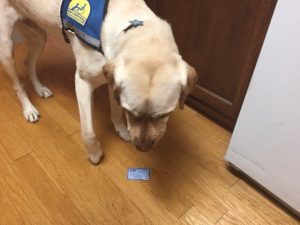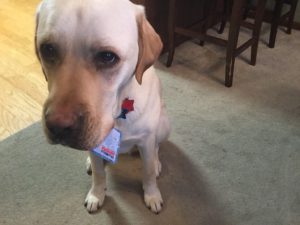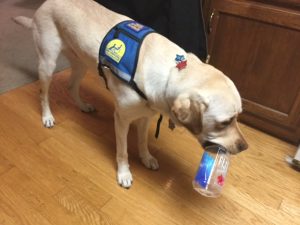Reef The Service Dog
Reef had no idea how he would begin to impact a life in November 2015. Reef was raised with an organization called Canine Companions for Independence, which is the largest non-profit provider of assistance dogs. The organization is recognized worldwide for the excellence of its dogs and the longevity of the matches it makes between dogs and people. Canine Companions is volunteer based, from the caretakers that provide homes for the breeder dogs and whelp the puppies until they are eight weeks of age, to the puppy raisers that provide socialization and obedience training to the puppies. Between fifteen and eighteen months the puppies make the journey back to one of five regional training centers across the country for six to nine months of training with professional instructors. The new owner is then required to travel to one of the regional training centers for two weeks to train alongside their new companion.
Reef was selected to help his owner that has been diagnosed with MS (Multiple Sclerosis). His owner is wheelchair-bound and Reef has been trained in multiple capacities in order to assist her throughout the day. Reef can pull her manual wheelchair, pick things up that she has dropped, retrieve bottled water from the fridge, turn light switches on or off, push the button for automatic doors, as well as about 40 other commands. In addition to helping her physically get through her day, Reef has helped his owner emotionally as well. His owner remarked that it only took one day to fall in love with Reef and that he has changed her personality for the better.
Reef was one of only 40% of dogs that make it through service dog training. There are four types of assistance dogs that Canine Companions helps train which are as follows: service dogs, hearing dogs, skilled companions, and facility dogs. The service dogs, like Reef, help assist adults with physical disabilities by performing daily tasks. Service dogs have also been trained to help disabled war veterans. The hearing dogs help to alert the deaf and hard of hearing to important sounds. Skilled companions are placed with children or adults with physical, cognitive, or developmental disabilities that cannot guide the assistance dog themselves. There is a family member that directs the skilled companion in ways to help the disabled owner. The final type of assistance dog is a facility dog that works with a professional in a visitation, education, or healthcare setting. If you happen to see Reef, or another assistance dog, out in public it is important to remember that they are working and to never approach them to pet them without the owner’s consent.
If you or someone you know would benefit from a dog like Reef, they can visit www.cci.org in order to learn more or even apply for an assistance dog. The Canine Companions for Independence organization is always looking for volunteers or even donations so they can continue to provide assistance dogs free of charge to owners in need. We at Dupont Veterinary Clinic love to see the numerous ways that animals, like Reef, continue to impact the lives of humans every day. Reef is truly an extraordinary companion and continues to bring joy to his owner’s life every day.
By Ashley Dawes, DVM





